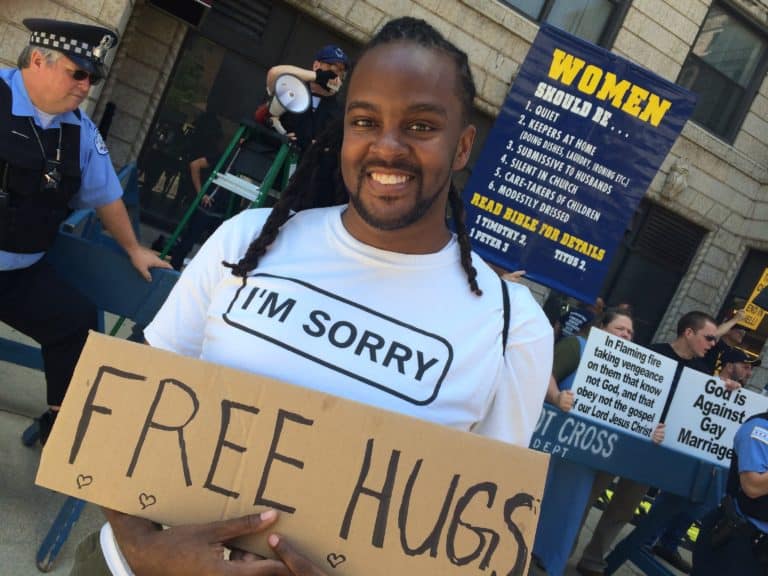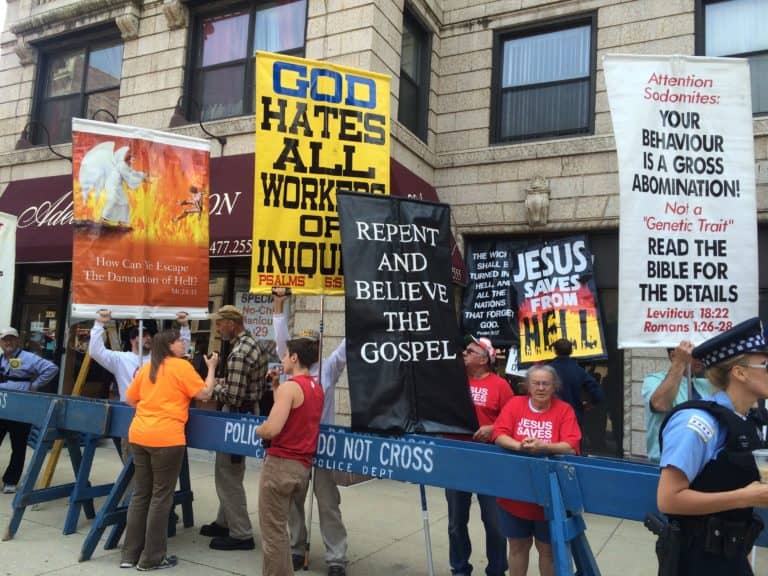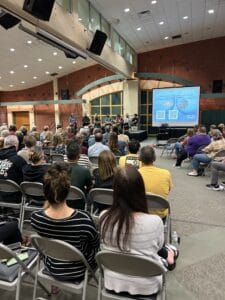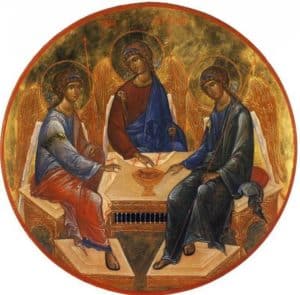 Tomorrow will mark my sixth year of being part of counter-protest efforts at the Chicago LGBTQ Pride parade. This effort started with the “I’m Sorry” campaign in 2010. At that time, a group of people gathered together to apologize for the way the church has harmed LGBTQ communities. We were a mostly Christian group of allies and LGBTQ+ people showing up at Pride to inspire a little more love and acknowledge the wrong that had been done by Christians. This tiny effort touched the hearts of many and went viral on the internet. Eventually this idea caught on and was replicated at Pride parades across the country and even beyond the United States.
Tomorrow will mark my sixth year of being part of counter-protest efforts at the Chicago LGBTQ Pride parade. This effort started with the “I’m Sorry” campaign in 2010. At that time, a group of people gathered together to apologize for the way the church has harmed LGBTQ communities. We were a mostly Christian group of allies and LGBTQ+ people showing up at Pride to inspire a little more love and acknowledge the wrong that had been done by Christians. This tiny effort touched the hearts of many and went viral on the internet. Eventually this idea caught on and was replicated at Pride parades across the country and even beyond the United States.
I’m excited to say that we’ll be back this year with the Make Love Louder at Pride campaign (#MakeLoveLouder). The Center for Inclusivity is sponsoring the effort as we rally Christians, Muslims, Atheists, LGBTQ people and their allies, religiously affirming and those from a conservative tradition, under the banner of humanity and love. We’ll be wearing red t-shirts and positioning ourselves between the parade marchers and the protesters near the end of the parade route.
If this idea excites you and you want to join us, I’m writing to help prepare you mentally and emotionally. If you’ve never been around the anti-LGBTQ protesters, it can be pretty intense. If you’re sensitive to the following descriptions, please take that into account and don’t ignore your gut.
 (Warning: triggering and harsh language ahead.)
(Warning: triggering and harsh language ahead.)
The protesters are a mix of people who are local as well as from infamous places like Westboro Baptist Church. They carry four-foot-tall banners and smaller posters and are on bullhorns the entire time. They call out individuals to question, blame, insult, and condemn. They say things like “I hope you get gonorrhea and die” or “You with the long hair, you’re going to rot in hell forever.”
They have signs that read “God hates fags.”
The protesters work to incite anger, and there’s no shortage of parade goers who will yell “f-you” and put up middle fingers at them in response.
Every year at least one person ends up getting arrested (and the protesters do press charges) for spitting or throwing something like a water bottle. This is a strategy that the protesters use as a revenue source by settling out of court with defendants.
It can be pretty crowded and hot (it’s a parade), and sometimes that can be a bit much for some people. Oh, and there are intoxicated people everywhere, so you know how that can go.I purposely try to describe the worst here, because I don’t want to lead anyone into something potentially harmful without warning them.
In contrast, I’ve never felt physically threatened. Uniformed Chicago police have the protesters barricaded in, and they escort them into the parade and back out at the end. Chicago Police surround the protesters by standing shoulder to shoulder outside of the barricade. The officers have always been pleasant toward us (parade goers and counter-protesters).
The best part for me is getting the crowd to cheer and drown out the hate speech.
I get lots of hugs—sometimes as people cry—in appreciation for my being there.
My arms get tired from high fives. 🙂
My face hurts from smiling and yelling “I love you!” or “God loves you!”
I’ve even gotten a little dehydrated from cheering and sweating (bring water!).
All that is to say that although the bad is BAD, the good is GREAT! People should talk and figure out what they are okay with and by no means should feel any pressure to come or to stay if they don’t feel good after experiencing what’s going on. By moving just a block away you can forget the protesters are even there and resume enjoying the parade. If you decide that this isn’t for you, that’s totally fine—survival is a form of resistance, so you thriving elsewhere that day is important, too!
So many of the people who have been part of this effort in the past didn’t realize beforehand how impactful the simple act of showing up could be. So many of us have shed tears of joy or been personally rocked by what this embodiment of love is about.
Darren Calhoun is a community activist and photographer based out of Chicago and one of CSA’s 2016 associate fellows for racial justice.


